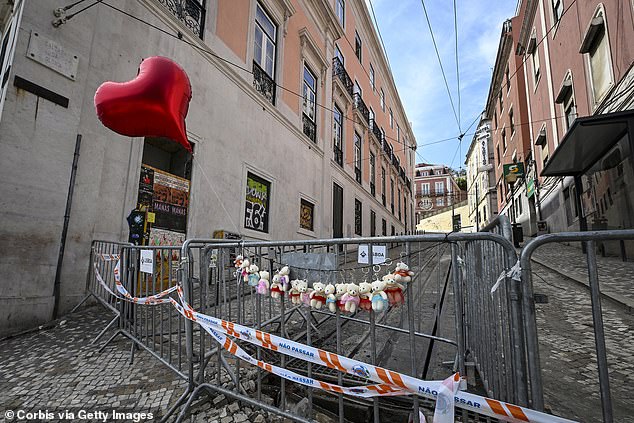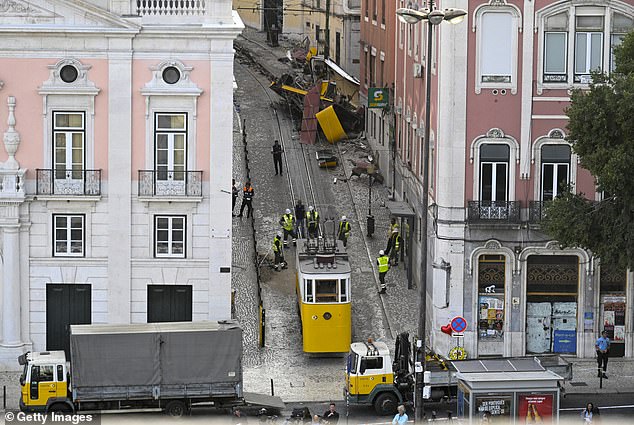A report has called for all Lisbon cable cars to be kept out of service for urgent modifications after it found a deadly crash was caused by faulty cables.
The disaster, described as ‘one of the biggest human tragedies’ in the country’s history, unfolded last month after the iconic Gloria funicular came off the rails and hurtled into a building, leaving 16 dead and 21 injured.
An initial assessment of the devastating tragedy found that the cable connecting the streetcar to another further down the hill had snapped and, despite the brake being applied, collided with the wall.
Theatre director Kayleigh Smith, 36, her partner Will Nelson, 44, a lecturer at Manchester’s Arden School of Theatre and Andrew David Kenneth Young, 82, were named as three Britons who died in the disaster.
More than a month on, Portugal’s Office for Air and Rail Accident Investigations has published a preliminary report into the crash, which found the cable should not have been used in the mechanism.
It found the installed cable ‘was not certified for use in installations for the transport of people’ and ‘did not comply’ with cable operator Carris’ (CCFL) specification for use in the Gloria funicular.
The report also ordered the company to cease operations until they can guarantee their cable cars have braking systems ‘capable of safely immobilizing the cabins in the event of a cable break.’
CCFL will also need to carry out a reassessment and review of ‘the processes of specification, procurement, receipt, and application of components critical to vehicle safety’ and the implementation of its safety management system.
The Gloria funicular tram disaster, which occured when the iconic streetcar derailed and crashed in the Portuguese capital on Wednesday evening, left 16 dead and 21 injured

The Lisbon tram crash which killed three Brits was caused when a cable connecting the two cabins snapped, investigators have said
Among the findings published in the report, it was revealed that the installed cable: ‘did not comply with CCFL’s specification for use in the Glória Funicular; was not certified for use in installations for the transport of people and was not suitable for installation with swivels at its ends’.
‘The use of cables that were non-compliant with multiple specifications and usage restrictions was due to several accumulated failures in the acquisition, acceptance, and application process by CCFL, whose internal organisational control mechanisms were insufficient or inadequate,’ the report added.
However, it also found that such cables were used in the Gloria funicular for 601 days, meaning investigators were unable ‘to state whether the non-compliances in cable use are relevant to the accident or not’.
To minimise the risk of cable degradation, workers were told to limit the cable’s usage to 600 days, which was ‘well below the expected lifespan’.
Elsewhere, the report found that the service provider who was subcontracted to carry out maintenance of the funiculars falsely reported certain tasks as being complete when they had not been.
The report stated: ‘There is evidence that maintenance tasks recorded as having been performed did not always reflect the work that had actually been carried out, and that critical tasks were being executed in a non-standardised manner, with varying execution and validation criteria.
‘The inspections scheduled for the day of the accident and preceding days were recorded as completed and workers were present at the site on those days, however, there is evidence that they were not performed during the recorded timeframe.’
CCFL workers and technicians were also well aware the cable car’s safety ‘depended entirely on the cable and that the braking system was not effective in stopping the cabins without the cable’.
The distinctive yellow-and-white funicular streetcar came off its rails at 6.05pm on Wednesday, September 3, careening down a hill towards a sharp bend before crashing into a hotel corner building.
The Elevador de Glória, used by millions of tourists and locals alike every year, was packed as Lisbon’s rush hour peaked.
The streetcar was heading downhill towards the city centre from the vibrant Bairro Alto when it crashed.
But Carris said that ‘we cannot assume the problem lies with the cable’.
They insisted that the funicular had undergone its full maintenance checks last year, and been looked over just nine hours before the crash.
CEO Pedro de Brito Bogas said on Thursday that there were six technicians, supervised by three engineers, who were responsible for maintaining the elevator.
But Mr Bogas did not detail what the visual inspection on September 3 entailed, or say whether all the cables were tested when asked.
Ms Smith had written on social media on the day of the crash that they spent their first day in Lisbon enjoying ‘churches and castles, tiles and trams’.
She posted scenic photos of the city’s grand architecture, her and her partner together, and two small beers by the coast as the sun set over Lisbon.

Heartbroken families of Kayleigh Smith and Will Nelson paid heart-wrenching tributes to their loved ones

Flowers, balloons and candles were left by wellwishers close to the scene of the crash
Young, from Holyhead on Anglesey, was described by his family as a ‘lifelong transport enthusiast’, adding that it gave them comfort that ‘his final moments were in pursuit of the hobby which gave him so much happiness’.
They said he spent his retirement ‘visiting heritage railways and tramways around the world’. He was raised in Auchterarder, Perthshire, but moved to Holyhead in 1980 where he had a ‘long career as a customs officer’.
Also among the dead were five Portuguese nationals, two Canadians, two South Koreans, one American, one French, one Swiss and one Ukrainian.
A No 10 spokesman said Prime Minister Sir Keir Starmer at the time he was ‘deeply saddened’ that three British nationals died.
‘His thoughts are with their families and those affected by this terrible incident,’ he said.
‘We stand united with Portugal during this difficult time.’
dailymail,news,Manchester,Portugal
#Lisbon #cable #cars #service #urgent #modifications #report #finds #faulty #part #caused #crash #killed

